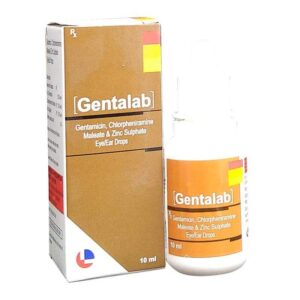BENZALKONIUM + GENTAMYCIN
Benzalkonium: Benzalkonium is a drug that belongs to the class of quaternary ammonium compounds. It is widely used as a surface disinfectant and preservative in numerous pharmaceutical and personal care products.
Its main mechanism of action is its ability to disrupt the structure and function of the cell membrane of microorganisms, leading to their death. Benzalkonium achieves this by interacting with the lipid layer of the bacterial cell membrane, causing destabilization, leakage of cellular contents, and ultimately cell death.
The dose of benzalkonium will vary depending on the specific product it is being used in. In disinfectants, it is typically present in concentrations ranging from 0.1% to 0.5%. In products such as eye drops or nasal sprays, it is used in lower concentrations.
Although benzalkonium is generally deemed safe for use, it can cause certain side effects in some individuals. These may include skin irritation, allergic reactions, and ocular irritation if it comes into contact with the eyes. Prolonged or excessive exposure to benzalkonium can lead to more severe skin reactions, such as dermatitis. It is worth noting that some studies have suggested a potential association between long-term use of benzalkonium-containing nasal sprays and reduced nasal function, leading to nasal congestion and chronic rhinitis. However, more research is needed to confirm these findings.
As with any drug, it is important to follow the instructions for use and consult a healthcare professional if any adverse effects occur.
Gentamycin: Gentamycin is an antibiotic primarily used to treat severe bacterial infections, particularly those caused by gram-negative bacteria. It belongs to the aminoglycoside class of antibiotics and is administered either intravenously or by injection.
Gentamycin works by inhibiting protein synthesis in bacteria, which ultimately leads to their death. It does this by binding to the bacterial ribosomes, preventing the formation of functional proteins necessary for bacterial growth and replication.
The dosage and duration of Gentamycin treatment depend on the severity of the infection, the patient’s age, weight, and kidney function. It is usually given in divided doses every 8 to 12 hours. The drug is often started with a loading dose, followed by maintenance doses to maintain a therapeutic level in the body. It is important to follow the prescribed dosage and complete the full course of treatment to effectively clear the infection.
As with any medication, Gentamycin can cause side effects. The most common side effects include nausea, vomiting, diarrhea, and stomach pain. It may also cause kidney damage, especially when used for prolonged periods or at high doses. Patients should be monitored regularly for any signs of kidney dysfunction, such as changes in urine output or color. Gentamycin can also cause hearing loss and balance problems, particularly with high doses or prolonged treatment. Other rare side effects include allergic reactions, skin rashes, and changes in blood cell counts.
It is important to note that Gentamycin should be used with caution in patients with pre-existing kidney problems, hearing impairments, or neuromuscular disorders.
Overall, Gentamycin is a potent antibiotic used for severe bacterial infections. However, its use should be carefully monitored, and patients should be aware of the potential side effects associated with its use.

